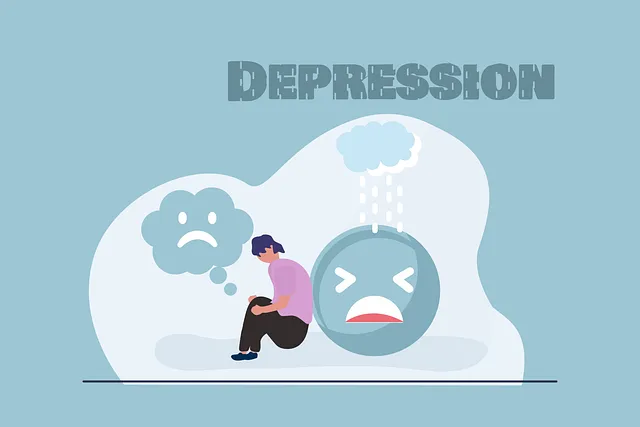Group facilitation at Boulder Kaiser Permanente behavioral health services is a powerful tool for mental wellness care, fostering supportive environments through open dialogue and peer connections. Skilled facilitators guide participants in emotional regulation, personal growth, and resilience building using professional strategies backed by positive outcomes seen in reviews. Effective communication techniques, like active listening, structured agendas, and risk management planning, enhance program effectiveness. Interactive community-building strategies create a sense of belonging and trust, leading to improved mental health education and adherence to treatment plans as underscored by the Boulder Kaiser Permanente behavioral health services reviews. Measuring success through quantitative and qualitative data shows significant improvements in participant mental wellness.
Mental wellness group facilitation plays a pivotal role in enhancing therapeutic outcomes at institutions like Boulder Kaiser Permanente Behavioral Health Services, as evidenced by positive reviews. This article delves into the art and science of group facilitation techniques used in mental health care. From understanding the facilitator’s role to implementing engaging communication strategies, we explore effective methods fostering community support. Additionally, we discuss measurement tools to assess the profound impact of these sessions, offering valuable insights for healthcare professionals.
- Understanding Group Facilitation in Mental Health Care
- The Role of a Facilitator at Boulder Kaiser Permanente Behavioral Health Services
- Effective Communication Strategies for Group Sessions
- Engaging Techniques to Foster Community and Support
- Measuring Success: Evaluating the Impact of Group Facilitation
Understanding Group Facilitation in Mental Health Care

In the realm of mental wellness, group facilitation plays a pivotal role in enhancing care and supporting individuals’ journeys to inner strength development. Techniques employed by facilitators at institutions like Boulder Kaiser Permanente behavioral health services are designed to foster a supportive environment where participants can navigate complex emotions and experiences. These professionals skillfully guide groups, encouraging open dialogue and sharing, which forms the backbone of effective mental health education programs.
Group facilitation in this context goes beyond mere conversation; it’s about creating a safe space for emotional regulation. Facilitators employ various strategies to help individuals process their feelings, gain insights, and build coping mechanisms. By fostering connections among peers, they create a supportive network that can significantly impact positive outcomes. The art of group facilitation empowers participants, offering them tools to navigate life’s challenges while cultivating inner strength and resilience.
The Role of a Facilitator at Boulder Kaiser Permanente Behavioral Health Services

At Boulder Kaiser Permanente Behavioral Health Services, facilitators play a pivotal role in fostering mental wellness within their communities. Their primary responsibility is to create a safe and supportive environment that encourages open dialogue and inner strength development among group members. These professionals are well-versed in crisis intervention guidance, ensuring participants feel heard and understood during challenging times.
Through active listening and strategic questioning, facilitators guide discussions, help individuals process emotions, and facilitate personal growth. They also contribute to the overall effectiveness of the program by providing healthcare provider cultural competency training, fostering an inclusive atmosphere that respects diverse backgrounds. This holistic approach not only enhances the group’s cohesion but also empowers members to navigate their mental health journeys with newfound resilience.
Effective Communication Strategies for Group Sessions

In facilitating mental wellness group sessions, effective communication strategies are paramount. At Boulder Kaiser Permanente behavioral health services, reviewed positively by many, facilitators employ active listening to ensure every participant feels heard and validated. This technique not only fosters a safe space but also encourages open dialogue, allowing individuals to share their experiences and insights honestly. By reflecting on and paraphrasing what participants say, facilitators demonstrate understanding and create an environment conducive to emotional expression.
Additionally, structured agenda planning plays a crucial role in managing group dynamics. Incorporating activities focused on Inner Strength Development can help members cultivate resilience and cope with challenges. Mental Wellness Podcast Series Production can also be integrated, offering diverse perspectives and practical tips that enhance the group’s collective knowledge. Moreover, robust Risk Management Planning for Mental Health Professionals ensures safety net, enabling facilitators to navigate complex situations effectively while prioritizing the well-being of all participants.
Engaging Techniques to Foster Community and Support

In facilitating mental wellness groups, engaging techniques are vital to fostering a supportive community among members. One effective approach is incorporating interactive activities that encourage active participation and promote open communication. For instance, icebreaker games tailored for group dynamics can help participants connect on a personal level, enhancing trust and camaraderie. These activities not only make sessions enjoyable but also serve as a Risk Assessment for Mental Health Professionals tool, allowing facilitators to gauge individual comfort levels and tailor subsequent discussions accordingly.
Additionally, creating structured yet flexible agendas that leave room for spontaneous conversations can stimulate meaningful exchanges. Incorporating diverse perspectives through sharing circles or round-robin discussions facilitates mental health education and promotes a sense of belonging. The Boulder Kaiser Permanente behavioral health services reviews highlight the importance of such community-building techniques in enhancing patient outcomes, as they contribute to a supportive environment where individuals feel safe to share their experiences and learn from one another. This, in turn, fosters a deeper understanding of mental wellness and encourages adherence to tailored treatment plans.
Measuring Success: Evaluating the Impact of Group Facilitation

Measuring success is a vital aspect of evaluating the impact of group facilitation techniques in behavioral health services. At Boulder Kaiser Permanente, reviews highlight that effective group sessions contribute to significant improvements in participants’ mental wellness. Facilitators employ various methods to assess progress, such as pre-and post-session surveys, where individuals rate their mood management skills and emotional intelligence. These tools provide quantitative data on the group’s overall well-being and satisfaction.
Additionally, qualitative feedback through open-ended questions offers deeper insights into participants’ experiences. The Community Outreach Program Implementation, for instance, has shown success in fostering a sense of belonging and support among members. Emotional intelligence, a key focus in these groups, enhances communication and relationship building, leading to more meaningful connections and long-lasting positive outcomes.
Group facilitation plays a pivotal role in enhancing mental wellness, as evidenced by the successful implementation at Boulder Kaiser Permanente Behavioral Health Services. By employing effective communication strategies and engaging techniques, facilitators can foster supportive communities that promote healing and growth. As highlighted in this article, understanding the unique dynamics of group sessions and measuring their impact through evaluation are essential for optimizing mental health care. The techniques discussed offer valuable insights into improving patient outcomes, as evidenced by positive Boulder Kaiser Permanente behavioral health services reviews.






